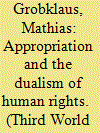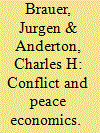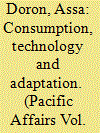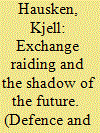|
|
|
Sort Order |
|
|
|
Items / Page
|
|
|
|
|
|
|
| Srl | Item |
| 1 |
ID:
139777


|
|
|
|
|
| Summary/Abstract |
This paper conceptualises appropriation as an analytical tool to capture the contradictory nature of human rights localisation. Here appropriation is understood as the intentional reinterpretation of ideas across cultural, spatial and temporal contexts aimed at definitional power. In the first part of the paper I lay out the concept and develop an operationalisation. In the second part I apply the framework to the case of contested gender reform in Nigeria. The analysis highlights the localisation of human rights norms as an amalgam of different competing appropriating acts, leading to a hybrid and contradictory outcome that bears both transformative and stabilising potential.
|
|
|
|
|
|
|
|
|
|
|
|
|
|
|
|
| 2 |
ID:
172146


|
|
|
|
|
| Summary/Abstract |
In reviewing the sweep of the extant literature over the past century or so, we first define and present an overview and conceptual synthesis of the field of conflict economics with a special view toward the subfield of peace economics. We explain that standard textbook economics is a special case of conflict economics and discuss assumptions, subject matter, and interrelations between economics and conflict. We also briefly discuss the nature of the peace and security good, including transboundary and transgenerational aspects. Second, focusing on new research opportunities arising from behavioral, identity, and social network economics we identify entire branches of economic theory that have been little harvested as yet to help address important aspects of conflict and peace. We provide illustrative models, each tied to economics’ standard rational choice setup. Third, we reflect on the use of conflict-related datasets in empirical research, illustrated with examples pertaining to data validity, missing data, data merging, and data mining.
|
|
|
|
|
|
|
|
|
|
|
|
|
|
|
|
| 3 |
ID:
113968


|
|
|
|
|
| Publication |
2012.
|
| Summary/Abstract |
On the edges of the digital world in India, there are millions of mobile phone users. To cater for these consumers, an economy of mobile phone care and repair has emerged in almost every town. Through the experiences of consumers and repairers, this article explores technology distribution, service practices and economic opportunity. How do they learn their trade? How do they make a living? And how do they position themselves in relation to the official branded manufacturers and licensed agents? Conceptually, the article is concerned with the nexus between consumer culture, the Indian middle class and the poor and how they engage global capitalism. It argues that middle-class ideologies and practices of consumption are both exclusive and expansive. At the same time, the poor seek to engage this economy by tapping into the unauthorized sector that responds to their demands for local participation in the global economy, while keeping them also at a certain distance from the forms and symbolic capital of the new economy.
|
|
|
|
|
|
|
|
|
|
|
|
|
|
|
|
| 4 |
ID:
083229


|
|
|
|
|
| Publication |
2008.
|
| Summary/Abstract |
Abstract A two-period exchange model is developed where production decisions in the first period determine the amount of resources available in the second period. Each agent allocates resources to defend its production and attack the production of the other agent. Production, conflict and exchange occur simultaneously in a dynamic model. This extends earlier exchange models, which are static and preclude defense and appropriation. The agents jointly determine price through their export decisions. Upon introducing exchange endogenously, raiding in the first relative to the second period decreases with growth, appropriation cost, and when the future becomes more important, and increases with defense cost, production cost, and usability of appropriation. Increasing the usability of appropriation and defense cost causes a transition from pure exchange via joint exchange and raiding to pure raiding. This implies that agents gradually substitute from defense to appropriation, they exchange less, and utility decreases. Utility isoquants in a usability of appropriation versus discount factor diagram are concavely increasing for joint exchange and raiding, and can be convexly decreasing for pure raiding. Cobb-Douglas utilities are assumed. The results are confirmed with CES utilities
|
|
|
|
|
|
|
|
|
|
|
|
|
|
|
|
| 5 |
ID:
163841


|
|
|
|
|
| Summary/Abstract |
Shakespeare's The Merchant of Venice has been reimagined, adapted, and appropriated by Arab playwrights and poets. The Arab Jordanian poet ʿArār (Mustafa Wahbi Al-Tal; 1897–1949) appropriates Shakespeare's anti-archetype of the figure of the Jew, Shylock, to criticize two local issues in the early twentieth-century context in Jordan and Palestine. First, the phenomenon of money-lending by Jordanian merchants, which led to the confiscation of the poor peasants' lands in the early twentieth century. Second, the condemnation of Zionism and its association with Western colonialism. Shakespeare's Shylock, on one hand, is recreated as a Jordanian Shylock, who is a usurer, and, on the other, as a Zionist Shylock. This remoulding of Shakespeare's Shylock as an Arab and Zionist reveals the post-Shakespeare Arab audience's new perception of The Merchant of Venice as a play about the political and behavioral affiliations of Shylock rather than about his Jewish ethnicity.
|
|
|
|
|
|
|
|
|
|
|
|
|
|
|
|
| 6 |
ID:
181902


|
|
|
|
|
| Summary/Abstract |
Oboo cairns are sacred monuments worshipped by minority peoples in Inner Mongolia. The inclusion of oboo worship on China’s national list of Intangible Cultural Heritage in 2006 has caused negotiations and innovations in different social and ritual strata of local societies. Going from provincial decision-making to the local interpretation of heritage classification, this article examines how the indigenous intelligentsia and ordinary people appropriate oboo to make them valuable and powerful sacred monuments.
|
|
|
|
|
|
|
|
|
|
|
|
|
|
|
|
|
|
|
|
|